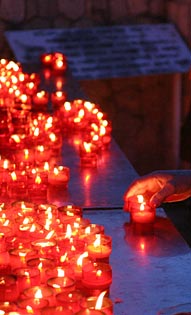
Be the Light
In the message of November 25th, 2001, Our Lady says:
“That is why, you who live my messages be the light and extended hands to this faithless world that all may come to know the God of Love.”
In all of Our Lady’s messages, we notice that they re-echo the biblical word. This message conforms this conviction, because the expression “be the light and extended hands to this faithless world that all may come to know the God of Love” can be another way of saying: "I am the LORD, I have called you in righteousness, I have taken you by the hand and kept you; I have given you as a covenant to the people, a light to the nations.” (Isaiah 42:6) and “You are the light of the world. A city on a hill cannot be hidden … let your light shine before men, that they may see your good deeds and praise your Father in heaven.” (Mt 5:14-16)
To be the light, we have to know what light means.
The theme of the light traverses all the biblical revelation. The separation of the light from darkness was the first creative act of the Creator. (Gn 1:3) At the end of the Salvation History, God Himself will be the light of the new creation. (Rev 21:5)
Old Testament
In the Old Testament, God is the creator of light, enwrapped in light (Ps 104:2), He is light itself (Wisdom 7:27.29). The light is a gift of God and God, becoming man in Christ, is the light of the world.
The coming of Christ is the fulfilment of the promises given to the prophets: “But for you who fear my Name, the sun of justice shall shine with healing in its rays…” (Malachi 3:20). “The people who walked in darkness have seen a great light; those who dwelt in a land of deep darkness, on them has light shined.” (Is 9:1) “I am the LORD, I have called you in righteousness, I have taken you by the hand and kept you; I have given you as a covenant to the people, a light to the nations, to open the eyes that are blind, to bring out the prisoners from the dungeon, from the prison those who sit in darkness.” (Is 42,7).
New Testament
In the New Testament, the theme of light is developed in three main directions:
· As the sun enlightens the path, so “light” enlightens our path to God. In the past, this was the Law, then the Wisdom and the Word of God (Ecc 2:13; Prov 4:18-19; 6:23; Ps 119:105), now it is Christ (Jn 1:9; 9:1-39; 1 Jn 2:8-11; cf. Mt 17:2; 2 Cor 4:6), who can be compared with the shining cloud from the time of the Exodus (Jn 8:12; cf. Ex 13:21; Wis 18:3).
Every Christian who manifests God to the world is also the light: “No one after lighting a lamp covers it with a vessel, or puts it under a bed, but puts it on a stand, that those who enter may see the light.” (Lk 8:16). “Do all things without grumbling or questioning, that you may be blameless and innocent, children of God without blemish in the midst of a crooked and perverse generation, among whom you shine as lights in the world…» (Phil 2:15) (See also: Mt 5:14-16; Rm 2:19; Rev 21:24).
· The light is the symbol of life, of happiness and joy. Darkness is the symbol of death, of unhappiness and of sorrow (Job 30:26; Is 45:7; cf. Ps 17:15). We oppose to the darkness of slavery the light of freedom and of messianic deliverance (Is 8:22-9:1; Mt 4:16: Lk 1:79; Rm 13:11-12), which – through Christ the Light (Jn; Eph 5:14) reaches even the pagan nations (Lk 2:32; Ac 13:47) and which will be accomplished in the Kingdom of heaven (Mt 8:12; 22:13; 25:30; Rev 22:5; cf. 21:3-4).
· Duality light-darkness is a sign of two opposite worlds, the world of Good and the world of Evil. So, in the New Testament, two “kingdoms” are shown: One is submitted to Christ and the other to Satan (2 Co 6:14-15; Col 1:12-13; Ac 26:18; 1 P 2:9). One tries to overcome the other (Lk 22:52; Jn 13:27-30).
Men are divided between “sons of the light” and “sons of darkness” (Lk 16:8; Ep 5:7-8; Jn 12:36), according to if they are under the influence of the light (Christ) or of darkness (Satan). (Mt 6:23; 1 Th 5:4; 1 Jn 1:6-7; 2:9-10). “But you are not in darkness, brethren, for that day to surprise you like a thief. For you are all sons of light and sons of the day; we are not of the night or of darkness. So then let us not sleep, as others do, but let us keep awake and be sober … since we belong to the day, let us be sober, and put on the breastplate of faith and love, and for a helmet the hope of salvation. … Therefore encourage one another and build one another up, just as you are doing. (1 Th 5:4-11)
“Sons of the light” are recognized by their works (Rm 13:12-14). “For once you were darkness, but now you are light in the Lord; walk as children of light (for the fruit of light is found in all that is good and right and true), and try to learn what is pleasing to the Lord. Take no part in the unfruitful works of darkness, but instead expose them.” (Ep 5:8-11)
This separation (judgement) between men was manifested by the coming of the Light, which demands each one to decide for or against it (Jn 3:19-21; 7:7; 9:39; 12:46; cf. Ep 5:12-13). “The night is nearly over; the day is almost here.” (Rm 13:12), darkness will flee before the light: “The light shines in the darkness, and the darkness has not overcome it.” (Jn 1:5).
The entire First Letter of John develops the theme of the Light and of Love. It is the best explanation of this Our Lady’s message: “And by this we may be sure that we know him, if we keep his commandments. He who says, "I know him" but disobeys his commandments is a liar, and the truth is not in him; but whoever keeps his word, in him truly love for God is perfected. By this, we may be sure that we are in him: He who says he abides in him ought to walk in the same way in which he walked. Beloved, I am writing you no new commandment, but an old commandment, which you had from the beginning; the old commandment is the word, which you have heard. Yet, I am writing you a new commandment, which is true in him and in you, because the darkness is passing away and the true light is already shining. He who says he is in the light and hates his brother is in the darkness still. He who loves his brother abides in the light, and in it there is no cause for stumbling. But he who hates his brother is in the darkness and walks in the darkness, and does not know where he is going, because the darkness has blinded his eyes.” (1 Jn 2:3-11)
“The righteous will shine like the sun in the kingdom of their Father. He who has ears, let him hear.” (Mt 13:43)
(Cf. Vocabulary of Biblical Theology; Bible of Jerusalem)



